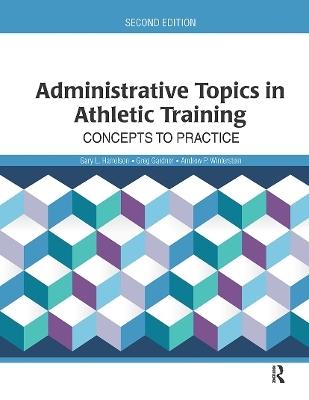
Administrative Topics in Athletic Training
SLACK Incorporated (Verlag)
978-1-61711-980-4 (ISBN)
Administrative Topics in Athletic Training: Concepts to Practice, Second Edition continues to be a dynamic text that addresses important administrative issues, practices, and procedures, as well as fundamental concepts, strategies, and techniques related to the management of all aspects of an athletic training health care delivery system. Uniquely, this text balances theory and application around management, administration, and leadership for the athletic trainer in multiple practice settings.
Inside the Second Edition, Drs. Gary Harrelson, Greg Gardner, and Andrew Winterstein feature case studies and instructional activities, both within the text and instructor materials, to help athletic training students and clinicians understand and apply the concepts to “real world” scenarios. Numerous graphic elements such as boxes, callouts, tables, and illustrations are included throughout the text to enhance readability.
New and updated features to the Second Edition:
Numerous case studies, examples, and classroom activities
12 appendices provide tools and examples to aid in the application of concepts and principles addressed in the text
Each chapter uses an Advanced Organizer to aid the reader in chapter orientation
All chapters have been updated to include changes in laws, regulations and practices
Issues in educational and clinical settings are broken into different chapters
Chapters have been grouped into three sections to improve flow of the text— Personal Practices, Athletic Training Practices and Organizational Practices
Faculty will have access to an Instructor’s Manual, PowerPoint slides, and Test Bank Questions
Updated topics inside the Second Edition:
Use of social media
Multiple generations in the workplace
Time management and prioritization
Process of writing a business plan
Athletic training as a business
Starting your own business
Administrative models in educational settings
Impact of degree transition in athletic training
Guidelines for appropriate medical coverage in secondary school and university settings
Expanding roles of Athletic Trainers in clinical settings
Included with the text are online supplemental materials for faculty use in the classroom.
Administrative Topics in Athletic Training: Concepts to Practice, Second Edition provides beneficial information on administrative topics and will be a useful resource for athletic training students, practitioners, and any administrator responsible for supervision of athletic trainers and athletic training service programs.
Gary L. Harrelson, EdD, PCC, ATC, received his bachelor's of science in athletic training, master's of science in exercise physiology, and EdD in administration and teaching all from the University of Southern Mississippi. He is the Director of Organizational Development and Education (ODE) for the DCH Health System in Tuscaloosa, Alabama. Since his certification as an athletic trainer in 1985, Dr. Harrelson has worked as an athletic trainer in multiple settings, which include high school, clinic, collegiate, and professional sports. Dr. Harrelson has taught in the athletic training curriculums at the University of Alabama and the University of Southern Mississippi. He was an Associate Editor for the Journal of Athletic Training and Athletic Therapy Today. Additionally, he is the coauthor of the book, Physical Rehabilitation of the Injured Athlete now in its fourth edition, Principles of Pharmacology for Athletic Trainers (3rd edition), as well as a CD-ROM on Joint Mobilization and an 8-video series on evaluation. He has authored numerous articles and made many professional presentations at the state, regional, and national levels as well as internationally. As a result of his position within the DCH Health System he either directly or indirectly supports the training and development initiatives across multiple health care professions. Greg Gardner, EdD, ATC, LAT is a Clinical Professor of Athletic Training and Chairperson of the Department of Kinesiology and Rehabilitative Sciences at the University of Tulsa. He completed his bachelor’s degree at the University of Wyoming and holds a master's degree from the University of Arizona. In 1995, he completed his doctoral work at the University of Southern Mississippi. Dr. Gardner has extensive experience as an athletic trainer and has been a certified athletic trainer for 30 years. His career includes work at the high school, small college, and major college level. He served on the JRC-AT and remained with that group as the transition to CAATE was completed. In November of 2008, Dr. Gardner was elected as the first President of the CAATE and served in that capacity until August 2012. Dr. Gardner is currently the US Vice President of the World Federation of Athletic Training and Therapy as well as the Vice President of the Oklahoma Athletic Trainers Association. He was named Most Distinguished Athletic Trainer by the National Athletic Trainers Association in 2010. He was also inducted into the Mid America Athletic Trainers Association Hall of Fame in 2013 and the Oklahoma Athletic Trainers Association Hall of Fame in 2014. Greg enjoys traveling, cooking barbecue, and is a certified barbecue judge. He lives in Tulsa, Oklahoma with his wife, Christi. Andrew P. Winterstein, PhD, ATC is a clinical professor in the Department of Kinesiology at the University of Wisconsin–Madison, where he currently serves as the program director of the athletic training professional preparation program. A graduate of the University of Arizona, University of Oregon, and the University of Wisconsin-Madison; Dr. Winterstein has been active in athletic training patient care and educational programming at the University of Wisconsin–Madison since 1986. Dr. Winterstein’s academic interests include: emerging technologies and their use in teaching and learning, medical humanities and their application to athletic training education, organizational dynamics, educational interventions/behavioral change, and patient-reported outcome measures following injury. His papers and abstracts have appeared a variety athletic training and sports medicine journals and he has been privileged to make numerous professional presentations at state, regional, national, and international conferences. In addition to this text he is the author of Athletic Training Student Primer: A Foundation for Success, Second Edition (SLACK Incorporated) and coauthor with Sharon Clark of The Athletic Trainer's Guide to Differential Diagnosis: A Visual Learning Approach (SLACK Incorporated). Dr. Winterstein has received numerous awards, including the 2016 NATA Most Distinguished Athletic Trainer Award, 2008 Great Lakes Athletic Training Association Outstanding Educator Award, 2007 Wisconsin Athletic Trainers’ Association Outstanding Educator Award, and the 2006 University of Wisconsin–Madison School of Education Distinguished Service Award. He and his colleagues are three-time winners of the NATA Educational Multimedia Committee award for educational innovations and have been awarded the MERLOT Classics Award for exemplary on-line learning objects. Dr. Winterstein enjoys fly fishing, standup paddling, watch collecting, reading, and writing. He resides in Madison, Wisconsin with his wife, Barb.
Foreword Preface Section I Personal Practices Chapter 1 Leadership and ManagementGary L. Harrelson, EdD, PCC, ATC Chapter 2 Ethical Practice in Athletic Training Chapter 3 Improving Personal Effectiveness Section II Athletic Training Practices Chapter 4 Risk Management in Athletic Training Chapter 5 Athletic Training Administration: Issues in Educational Settings Chapter 6 Athletic Training Administration: Issues in Clinical Settings Chapter 7 Employment Issues in Athletic Training: Organizational Influences and Socialization for Professional Roles Section III Organizational Practices Chapter 8 Budget and Finance Chapter 9 Human Resources Chapter 10 Medical Records and Documentation Chapter 11 Business: Revenue and Reimbursement Opportunities Chapter 12 Improving Organizational Performance Appendix A Examples of Types of Interview Questions Appendix B Sample Athletic Training Outreach Contracts Appendix C Athletic Training Initial Evaluation Appendix D Examples of Function and Impairment-Based Goals Appendix E Goal Writing Tips Appendix F Daily Notes Appendix G Athletic Training Progress/Discharge Note Appendix H Athletic Training Chart Review Appendix I Sample Insurance Appeal Letter Appendix J Standard Medical Abbreviations Appendix K Board of Certification Standards of Professional Practice Appendix L Business Plan Template Financial Disclosures Index
| Erscheinungsdatum | 21.08.2016 |
|---|---|
| Sprache | englisch |
| Maße | 216 x 279 mm |
| Gewicht | 1360 g |
| Themenwelt | Medizin / Pharmazie ► Medizinische Fachgebiete ► Sportmedizin |
| Medizin / Pharmazie ► Physiotherapie / Ergotherapie | |
| ISBN-10 | 1-61711-980-6 / 1617119806 |
| ISBN-13 | 978-1-61711-980-4 / 9781617119804 |
| Zustand | Neuware |
| Haben Sie eine Frage zum Produkt? |
aus dem Bereich


